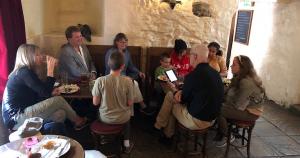 We are building a building and for that we need an architect, engineers, and other workers. I do not have training in any of these areas, so my job has been to get multiple educated perspectives (putting the project out to bid, getting an oversight team) and staying out the way.
We are building a building and for that we need an architect, engineers, and other workers. I do not have training in any of these areas, so my job has been to get multiple educated perspectives (putting the project out to bid, getting an oversight team) and staying out the way.
A man must know what he does not know.
I am glad that our building will, weather willing, be done by February. This hard task will be done.
There is a different sort of project that can be frustrating compared to construction: working on knowing ourselves. Because this job is never done, I find it frustrating and so am tempted to ignore the job. Progress is slow, yet the potential rewards are great. A wise person is not born, but made over time.
God help us! There is a good reason for the slow process: the difficulty of the task.
Compared to the soul, a building is not so complex. Even one material basis of our body’s interaction with our mind, the brain is the most complex structure in the material cosmos (so far as we have discovered). Humans have hardly begun to understand our brains let alone our consciousness.
Ideas, numbers, and consciences are immaterial things. They are easy to “get,” hard to understand. After all, everyone has consciousness or they would not be part of “everyone!” In the same way, a virtue like courage can exist without any training at all, thank God. Some people are courageous by nature and they come by courage naturally. However, like a natural athlete, even such a person can become more virtuous with training and reflection. Many deeds that seem courageous turn out be merely rashness: rushing in where angels fear to tread!
One way, pioneered by Socrates and perfected by Jesus, to grow in virtue is conversation with clarification of our ideas. We have a crude notion of courage, but make mistakes, sometimes deadly ones. Recall the man of “courage” who will destroy his life in dueling rather than be thought a coward in the face of an insult. He has something like courage, but nothing is more deadly to the soul than an almost-virtue.
Of course, “talking” is frustrating and looks like not doing: “Just build the soul,” we moan when the true philosopher (an Al Geier) shows how little we know. Isn’t this just “logic chopping?” Or a “word salad?” Can’t we just go do some “science” and build the building?
Logic can be abused, but getting the argument right is vital to seeing our errors and the right pathway. Words can multiply foolishly, but clarification about what we mean may take some time, but after we achieve clarity we can act quickly and precisely. The complaints do have a basis. Some Sophists, perhaps lacking courage, do substitute talking about virtue for acting virtuously. This sophistry is false wisdom, interested in making money by charging tuition for a credential and caring nothing about education.
Discussion and philosophy lead to virtuous living, not merely more discussion! The discussion is for the community and not the community for the discussion. However, for every sophist closeted from life in words, with a doctorate in otiosity, there is a fool hoping his natural virtue will be enough, pragmatic and churlish. The otiose sins by omission, the churl sins by commission.
Plato writes of a “man of action” (Laches) who is a churl and a fool. He is too impatient to become truly courageous even though he has a natural boldness and a job as a general. Socrates is also a man of action, a brave warrior, but he is truly courageous in part because he has taken the time to know himself. Laches wants the reputation and the title (courage, general), while Socrates wants the reality.
Laches is frustrated when Socrates presses him on the nature of courage as virtue:
LACHES: No, I won’t say anything, Socrates, because it’s more appropriate for a Sophist to dabble in such subtleties than it is for a man who’s been chosen by his fellow citizens as one of their leaders.
SOCRATES: Well, my friend, I dare say that it’s appropriate for someone with the greatest responsibilities to have the greatest intelligence. And I do think we ought to try to see what has led Nicias to use the term ‘courage’ in this way.*
Does moral philosophy make progress?
Yes, but it is slow, because (in part) moral progress is individual. Even though we stand at the end of centuries of great thought on courage, you and I must learn the lessons ourselves and each of us must know our own needs. None of us are the same, no guru can give one fix that will make every student courageous. Instead, true education helps each person know himself and so know what he needs. Each life given to the examined life, the love of Wisdom, can become more virtuous showing greater courage, moderation, practical wisdom, and justice. By God’s grace, we can also grow in hope, faith, and love.**
———————————————-
*Laches 197 d-e, Plato. (Translated by Robin Waterfield)
**This examines growth in virtue not salvation. We are broken by nature and so cannot save self. We can improve, but not earn paradise. That is a different subject altogether!












